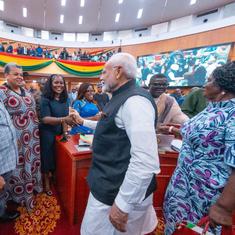The Big Story: Coup card
Despite coming in second in Goa Assembly elections, the state’s Governor on Sunday invited the Bharatiya Janata Party to form the government after it cobbled together support from eight other Assembly members. Manohar Parrikar is set to resign as Union Defence Minister and will now return to Goa to be sworn in as chief minister on Tuesday, less than three years after he left the post to move to Delhi.
The Congress cried foul on Monday, and is probably hoping that the same fate doesn’t befall it in Manipur, where it also ended up as the single largest party but has failed to so far bring in the alliance partners necessary to form government. But the Congress official in charge of Goa Digvijay Singh has already admitted it was their failure and apologised for not being able to muster the support to form the government. Singh claimed the BJP won thanks to “money power”, the standard complaint for anyone who hasn’t managed to stitch together a coalition after a hung assembly. But it also seems evident that the Congress took too long to decide on its own legislative party leader, never mind attempting to negotiate with the potential allies.
Parrikar returns to Goa with his political star somewhat diminshed. No major scandal dogged him in his time as defence minister, but his tenure was also not the success story that the BJP hoped it would be. More importantly, the people of Goa delivered a clear verdict about the mess he left behind in the state.
The BJP may have won 13 seats in the 40-strong assembly, but its incumbent chief minister Laxmikant Parsekar and seven other ministers in his cabinet were defeated in the election. That is about as clear a signal of anti-incumbency as you can get in a hung election.
The BJP reportedly only pulled off its alliance – bringing in former allies in the Maharashtrawadi Gomantak Party, adding the Goa Forward Party and two more independents – on the condition that Parrikar would be the chief minister. But for all his reputation as an efficient administrator, Parrikar’s political skills will be tested as he attempts to control an alliance that may yet be shaky. Voters in the Goa Forward Party, for example are already complaining about being let down by the alliance. Moreover, the message sent about the previous government is not to be dismissed. Parrikar will have to work much harder to earn his legitimacy as chief minister of the party that actually came in second place in the state.
Subscribe to “The Daily Fix” by either downloading Scroll’s Android app or opting for it to be delivered to your mailbox. If you have thoughts or suggestions about the Fix, please email rohan@scroll.in. If you have any concerns about our coverage of particular issues, please write to the Readers’ Editor at readerseditor@scroll.in.
Picks & punditry
- “We are entering a new era of extraordinary dominance by the BJP. All institutions will be tested,” writes Pratap Bhanu Mehta in the Indian Express.
- Roshan Kishore in Mint examines the data to show how Narendra Modi is building a Hindu voter base across the country.
- Khurram Husain in Dawn is perturbed by news of Chinese-only zones in Pakistan, and asks the government to come clean on what the trade-off is.
Giggle
#cartoon @timesofindia #UPResults2017 pic.twitter.com/VccvRmYK4z
— Sandeep Adhwaryu (@CartoonistSan) March 12, 2017
Don’t miss
Shoaib Daniyal asks: With the Bharatiya Janata Party’s massive win in Uttar Pradesh, is Prime Minister Narendra Modi approaching Jawaharlal Nehru levels of dominance?
“In Uttar Pradesh, as it now stands, the BJP’s 2017 vote share has outstripped every performance of the Congress in each Uttar Pradesh state election it fought under the leadership of Indira Gandhi. Moreover, the BJP’s 2017 vote share is higher than even the Congress’ in 1962 – the final Uttar Pradesh election the Grand Old Party fought under Nehru’s leadership.
This is no small achievement. One-sixth of India’s population lives in Uttar Pradesh. Apart from the sheer weight of numbers, there is the political capital the state carries. It is hardly a coincidence that every prime minister to command a majority in the Lok Sabha on his/her own has won an election from Uttar Pradesh. Even Narendra Modi, a Gujarati, abandoned his state and chose to represent the Uttar Pradesh city of Varanasi in Parliament. The importance of the scale of the 2017 Uttar Pradesh win for Modi’s stature can, therefore, hardly be emphasised enough.”










